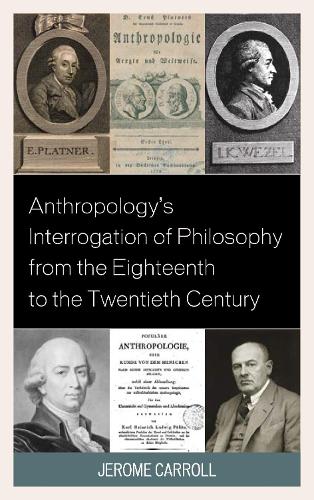
Anthropology's Interrogation of Philosophy from the Eighteenth to the Twentieth Century
(Hardback)
Publishing Details
Anthropology's Interrogation of Philosophy from the Eighteenth to the Twentieth Century
By (Author) Jerome Fanning Marsden Carroll
Bloomsbury Publishing PLC
Lexington Books
6th December 2017
United States
Classifications
Professional and Scholarly
Non Fiction
General and world history
Social and cultural anthropology
Philosophical traditions and schools of thought
Anthropology
301.01
Physical Properties
Hardback
256
Width 160mm, Height 238mm, Spine 23mm
503g
Description
Anthropology's Interrogation of Philosophy from the Eighteenth to the Twentieth Century presents and discusses key aspects of the German tradition of philosophical anthropology from the eighteenth to the twentieth century, centering on the concept of anthropology as a study of the whole, concrete man (Heinrich Weber, 1810). Philosophical anthropology appears during the last decades of the eighteenth century in the often practically-oriented writings of men such as Ernst Platner, Karl Wezel, and Johann Herder, and is then taken up in the twentieth century by thinkers including Max Scheler, Helmut Plessner, Arnold Gehlen, and Hans Blumenberg. In presenting this tradition, the book serves two primary purposes. Firstly, it introduces English readers in a coherent manner to key aspects of a two-hundred year tradition in German thought. Secondly, the book analyzes in an unprecedented manner, even in German scholarship, the connections between the philosophical debates associated with anthropology at the end of the eighteenth century and ongoing philosophical issues in the twentieth century. Specifically, author Jerome Carroll argues that late eighteenth century anthropology diverges pointedly from traditional, "foundational" approaches to philosophy, for instance rejecting philosophys quest for absolute foundations for knowledge or a priori categories and turning to a more descriptive account of mans "being in the world." Notably, by drawing on the epistemological, ontological, and methodological aspects and implications of anthropological holism, this book reads the philosophical significance of classical twentieth century anthropology through the lens of eighteenth century writings on anthropology.
Author Bio
Jerome Fanning Marsden Carroll is lecturer at the University of Nottingham.
